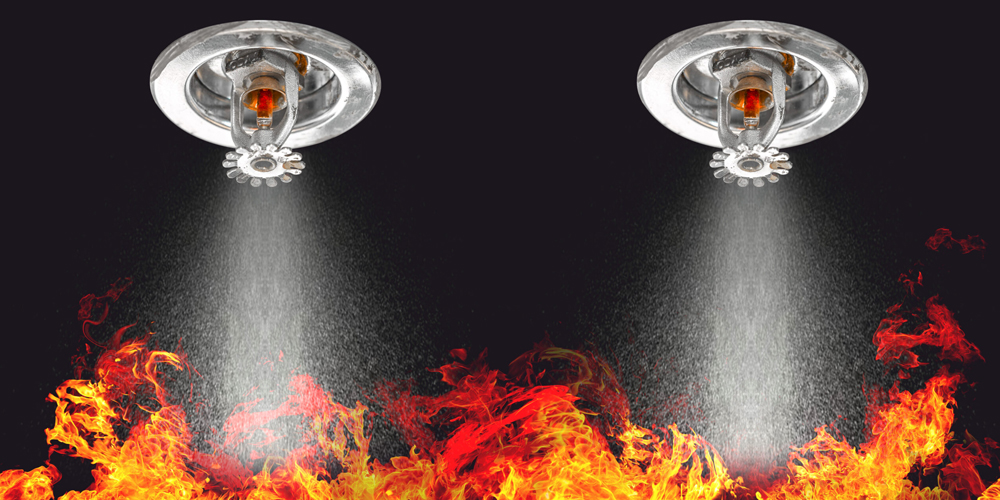
NR Square Enterprises is a Mumbai based, contractor offering wide range of Firefighting, Fire Alarm, Public Address, CCTV, Access Control services with different agencies, Site Survey, Designing of all kinds of Fire Fighting systems, Preparation of BOQ / Tender.
Currently NR Square Enterprises is working with Semi Government & leading private organizations. Our approach is to provide most reliable firefighting solutions and cost-effective services to our clients. As a dynamic leader we can provide a diverse range of top-quality services and installations all over India.
We are Specialized in:
An ESFR (Early Suppression Fast Response) sprinkler system is a type of fire protection system commonly used in warehouses and industrial facilities. It is designed to provide rapid and effective fire suppression, specifically for high-piled storage areas where traditional sprinkler systems may be inadequate.
Fire Sprinkler System
A fire sprinkler system is an active fire protection measure commonly installed in buildings to suppress or control fires. It consists of a network of pipes filled with water or other fire-suppressing agents, along with a series of sprinkler heads strategically placed throughout the structure. When a fire occurs, the heat from the flames activates the sprinkler heads, causing them to release water or other fire-extinguishing agents onto the affected area.
Key points of Fire Sprinkler Systems:
Operation: Each sprinkler head operates independently, meaning only the sprinklers closest to the fire are triggered. This targeted response helps to minimize water damage and allows occupants to evacuate safely.
Types of sprinklers: There are different types of sprinklers available, including wet-pipe, dry-pipe, pre-action, deluge, and foam-water sprinklers. The choice of sprinkler system depends on factors such as building occupancy, fire hazards, and local regulations.
Activation: Sprinkler heads are designed to activate when a specific temperature is reached. Most commonly, individual sprinkler heads are activated when the temperature at their location exceeds a certain threshold (usually between 135 to 165 degrees Fahrenheit or 57 to 74 degrees Celsius).
Water supply: Fire sprinkler systems are typically connected to the building's water supply or have dedicated water storage tanks. The water supply must be capable of providing adequate pressure and volume to effectively suppress a fire.
Maintenance and inspections: Regular maintenance and inspections are essential to ensure the proper functioning of a fire sprinkler system. This includes checking for leaks, blockages, and proper water pressure, as well as testing alarm systems and control valves.
Effectiveness: Fire sprinkler systems are highly effective in controlling and extinguishing fires. They have been proven to save lives, reduce property damage, and provide valuable time for occupants to evacuate safely before the arrival of firefighters.
It's worth noting that fire sprinkler systems are subject to various building codes and regulations, which may vary depending on the jurisdiction and building type. These regulations dictate the installation, design, and maintenance requirements for fire sprinkler systems. Consulting with a fire protection professional or local authorities is essential when designing, installing, or modifying a fire sprinkler system to ensure compliance and optimal safety.
Fire Sprinkler System application industries:
Fire sprinkler systems are widely used in various industries to provide fire protection and minimize the risk of fire-related damage. Some of the industries that commonly employ fire sprinkler systems include:
Residential Buildings: Fire sprinklers are often installed in residential buildings, including single-family homes, apartment complexes, and condominiums, to protect residents and property from fire hazards.
Commercial Buildings: Sprinkler systems are extensively used in commercial buildings such as office complexes, retail stores, shopping malls, hotels, restaurants, and theatres to safeguard occupants and assets.
Industrial Facilities: Industries like manufacturing plants, warehouses, factories, refineries, and chemical processing plants often incorporate fire sprinkler systems as a vital part of their fire safety measures due to the presence of flammable materials and potential fire hazards.
Healthcare Facilities: Hospitals, clinics, nursing homes, and other healthcare facilities rely on fire sprinklers to protect patients, staff, and critical medical equipment from fire damage.
Educational Institutions: Schools, colleges, and universities utilize fire sprinkler systems to ensure the safety of students, faculty, and valuable educational resources.
Government Buildings: Government offices, courthouses, libraries, and other public buildings typically have fire sprinklers installed to protect government personnel and sensitive documents.
Data Centres: Sprinkler systems are utilized in data centres to safeguard the valuable data stored within the facility and to prevent potential fire-related disruptions to critical IT infrastructure.
Warehouses and Distribution Centres: Facilities involved in storage, warehousing, and distribution of goods, such as logistics centres and warehouses, often employ fire sprinkler systems to protect inventory, minimize business interruption, and ensure the safety of personnel.
Hospitality Industry: Hotels, resorts, and hospitality establishments install fire sprinklers to provide a safe environment for guests and protect their property.
Entertainment Venues: Fire sprinklers are commonly found in entertainment venues like theatres, cinemas, concert halls, and stadiums to safeguard the audience, performers, and valuable equipment.
Fire safety is a critical concern in many sectors, and sprinklers are an essential component of comprehensive fire protection strategies.
